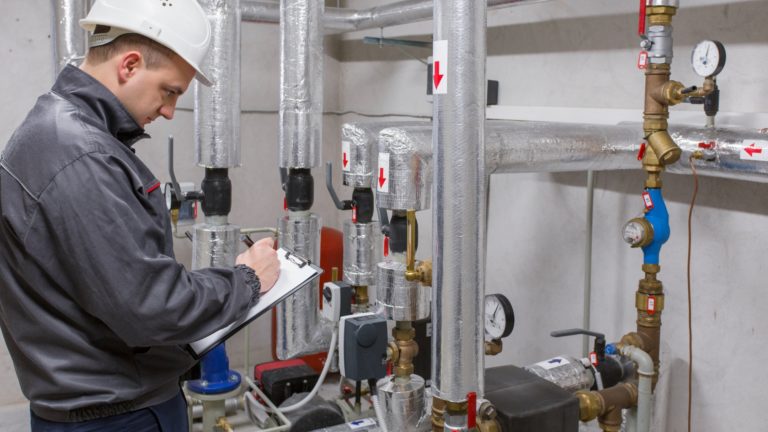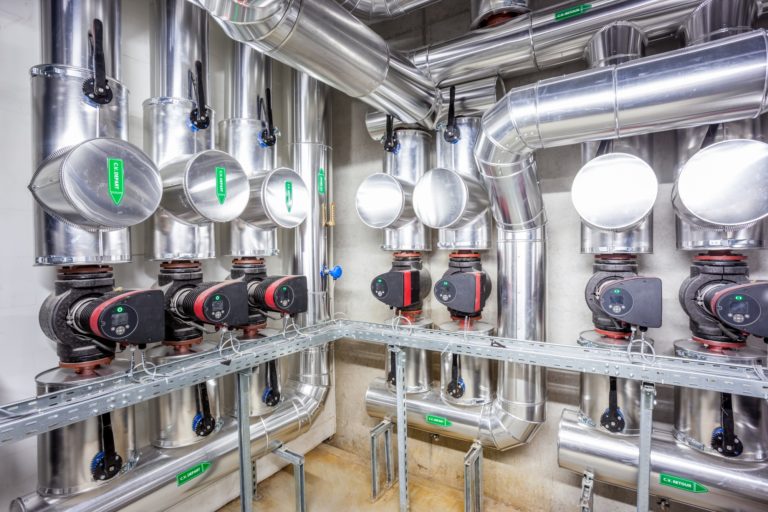To make this measure more effective and tailored to the specific context of your company, we recommend that you first perform an overall analysis of your energy situation.
Ensuring efficient heating system performance in the workplace
The production of heat for premises and production processes represents a major cost factor. To reduce heating costs, This is why it is essential to ensure that the heating system operates correctly and is as economical as possible. This also includes all peripheral installations, heat production and distribution.
Definition of the company’s heating requirements
Heating system inspection
- Determination of the different parameters of the current installation, for example: age, general condition, temperature level, consumption and associated costs, etc.
- Energy evaluation of the heating system through the “Heizungscheck” inspection process by a qualified professional (heating engineer)
Taking your heating installation project one step further
- Heat consumption analysis
Track changes in heat consumption based on the latest energy bills, or meter data where applicable. - Cross-referencing consumption data with heat production indicators
- Checking for leaks in the network
Implement measures to optimize the heating system
For heat production
- Periodic maintenance and inspection of heat production units
- Optimisation of system operating periods according to need, e.g. night-time reduction, summer mode, etc. => Additional information developed by SuisseEnergie “Reduce the flow temperature outside of usage periods” and “Give your heating a summer break“
- Checking the heating curve => Further information from SuisseEnergie “Set the heating curve correctly“
For heat distribution
- Circulation pump flow and return temperature control. Adaptation considering shutdown periods. => Further information from SuisseEnergie on “Reduce the circulating pump’s flow rate”
- Replacement of fixed-flow circulation pumps with energy-efficient, variable-flow pumps
- Inspect and, if necessary, insulate the system’s various thermal components (pipes, valves, pumps, etc.)
- Rule of thumb: cover pipes with an insulation thickness at least equal to the inside diameter, ideally twice the pipe diameter
- Hydraulic balancing
For heat consumption
- Use of room temperature control devices, e.g. smart thermostats. Additional information developed by SuisseEnergie “Set thermostat valves correctly before the heating season” and “Protect thermostat valves and limit the temperature“.
- Reduce or switch off heating in unused areas, e.g. corridors, staircases, meeting rooms, plant rooms.
- Regularly bleeding radiators. Further information developed by SuisseEnergie “Vent radiators in autumn“.
- Reduce the setpoint temperature in accordance with the minimum temperature recommendations in the ITM specification “Ventilation and air-conditioning systems”. ITM-SST-1814-1.pdf
- Appropriate use of heating in the production halls, using air heaters, infrared heaters, etc. only when necessary.
Subsidy application
Government subsidies
Please note: any application for government or non-government subsidies must comply with the “incentive effect”, subject to compliance with the subsidy conditions.
- “Fit 4 Sustainability” programme
- The Fit 4 Sustainability programme co-finances an environmental audit + action plan on one or more of the topics selected by the company (energy, greenhouse gases, waste, water, etc.).
- Assistance of up to 50 %, 60 % and 70 % of the fees for carrying out an environmental study (energy audit and/or carbon assessment) + detailed, costed action plan to reduce consumption/greenhouse gases (medium- and long-term investment, ROI, etc.) – open to SMEs and large companies (except for those required to carry out a statutory audit).
- For questions:
- SME Packages – Sustainability
- Financial Aid for small and medium-sized enterprises covering up to 70% of eligible costs for the implementation of a project aimed at reducing the environmental impact. The eligible project budget must be in a range from 3.000 € to 25.000 € excl. VAT.
- For more information:
- Chambre des Métiers for craft companies
- Chamber of Commerce for businesses in the non-craft sectors
- Environmental protection scheme – Investment subsidies for environmental protection
- Verification of company eligibility and costs: General Directorate – Industry, New Technologies and Research
- Support in drawing up the application file prior to submission to the Ministry of the Economy
- For more information : Luxinnovation
- More information and guidance for businesses on environmental investment is available in the Simplified Guide for Businesses (FR).
N.B.: State subsidy cannot be combined for the same project.
Application for subsidies from electricity and natural gas suppliers
As of 2015, natural gas and electricity suppliers are obliged under the Commitment Mechanism to generate energy savings among their consumers. Since then, energy suppliers have been offering monitoring and advisory services as well as subsidy programmes for consumers to implement energy efficiency measures.
- Enoprimes Enovos + SUDenergie
- SUDenergie
- Sudstroum
N.B.: Subsidies from suppliers can be combined with state subsidies for the same project.

